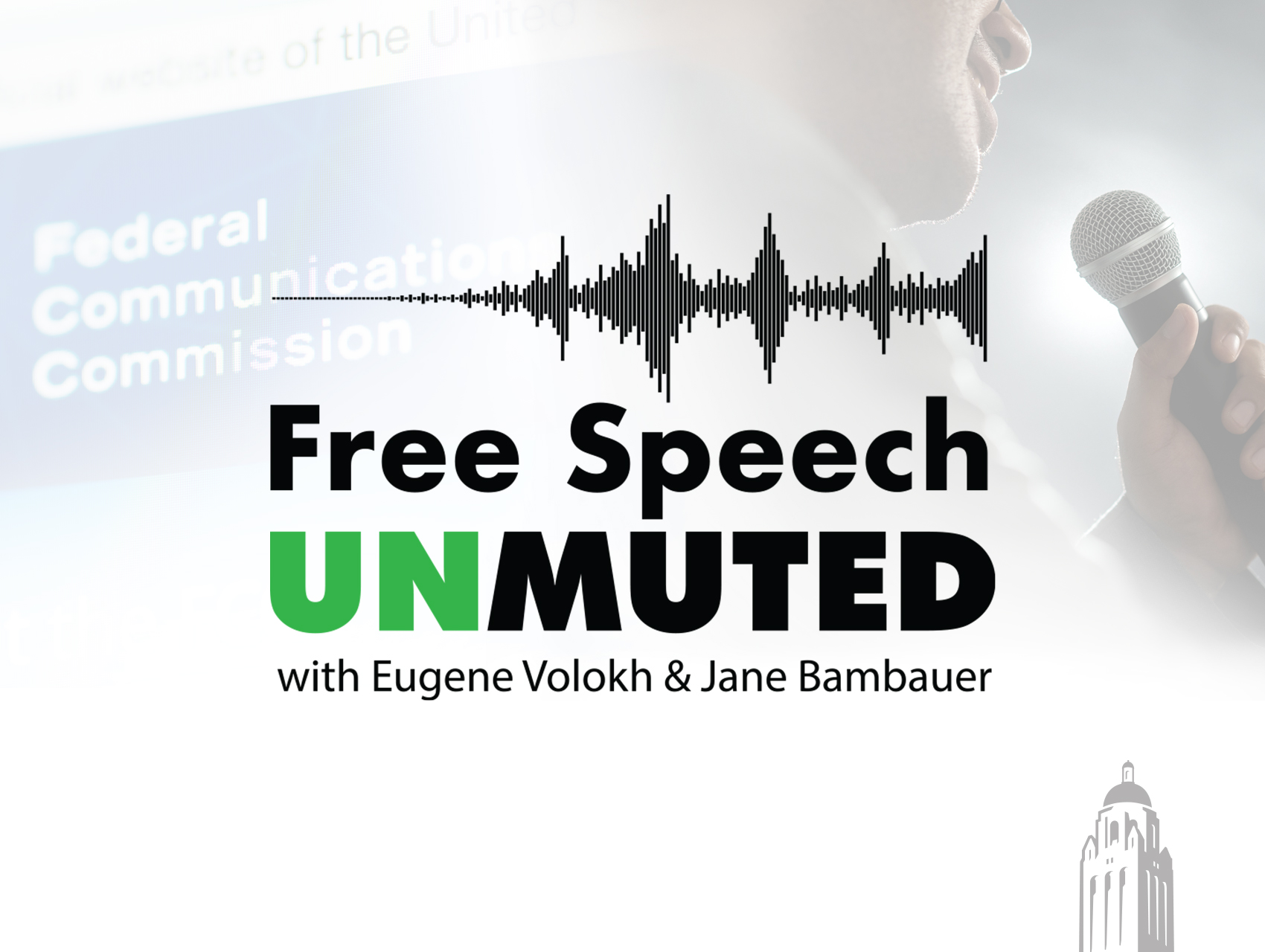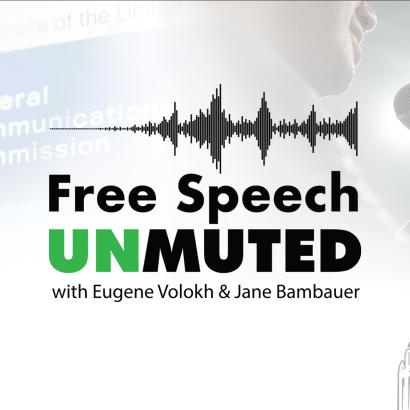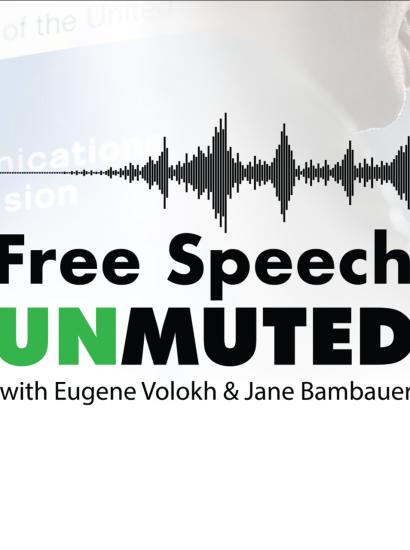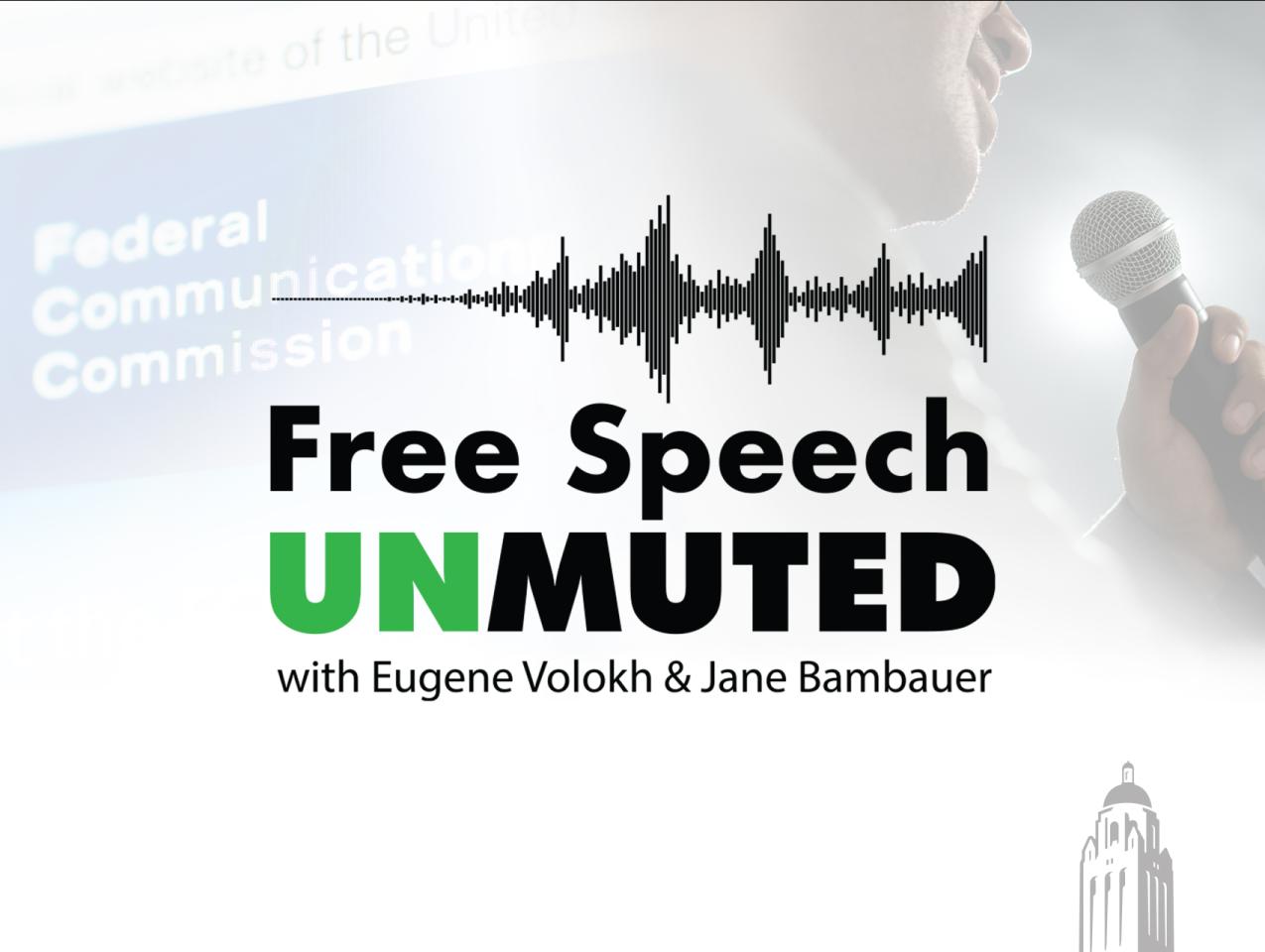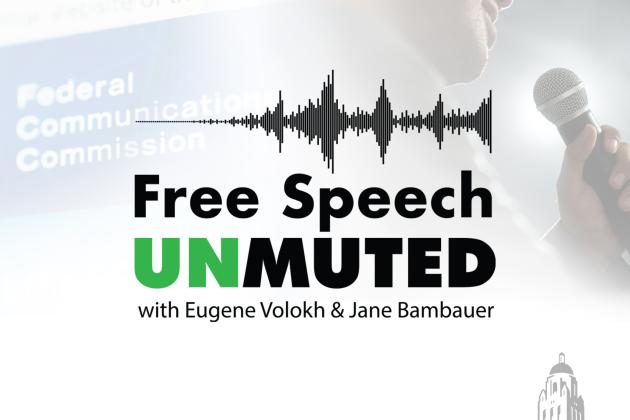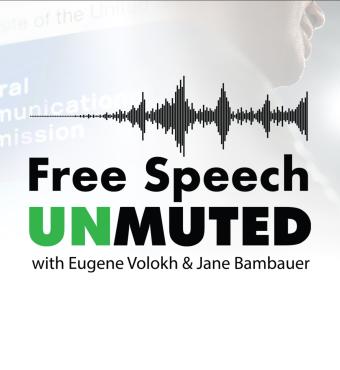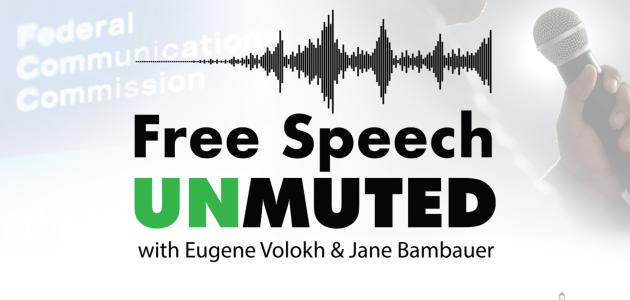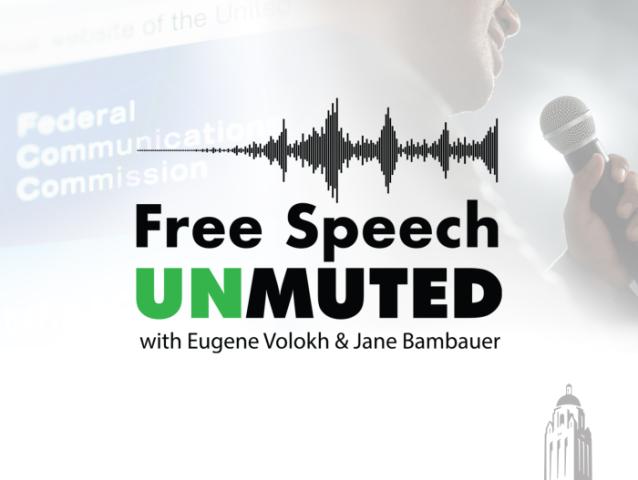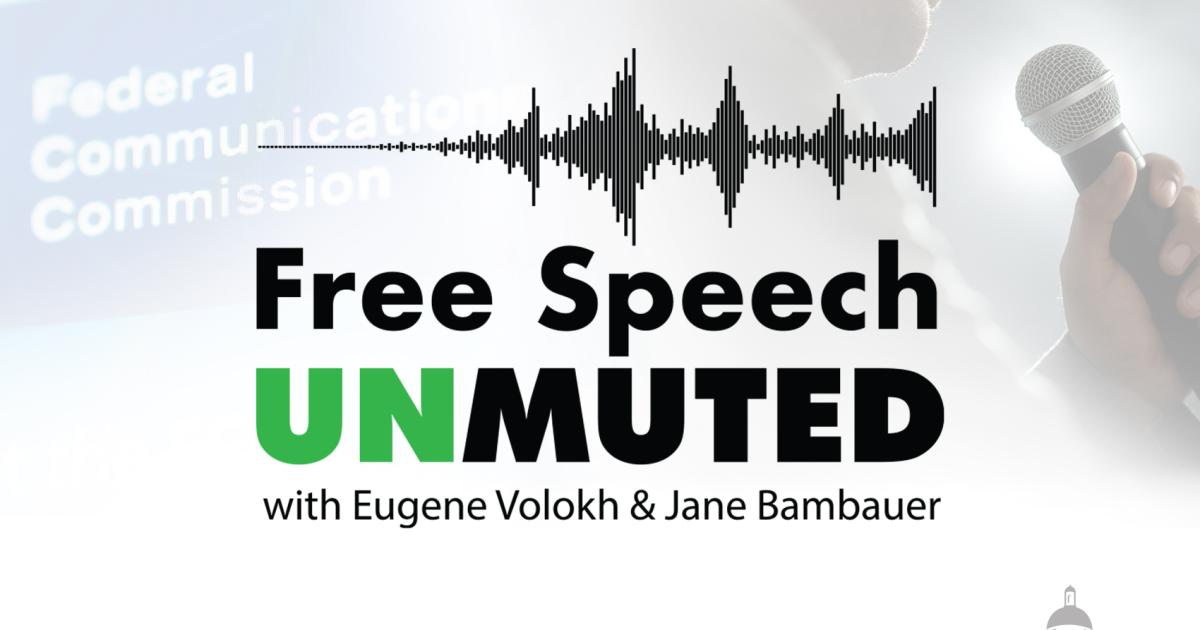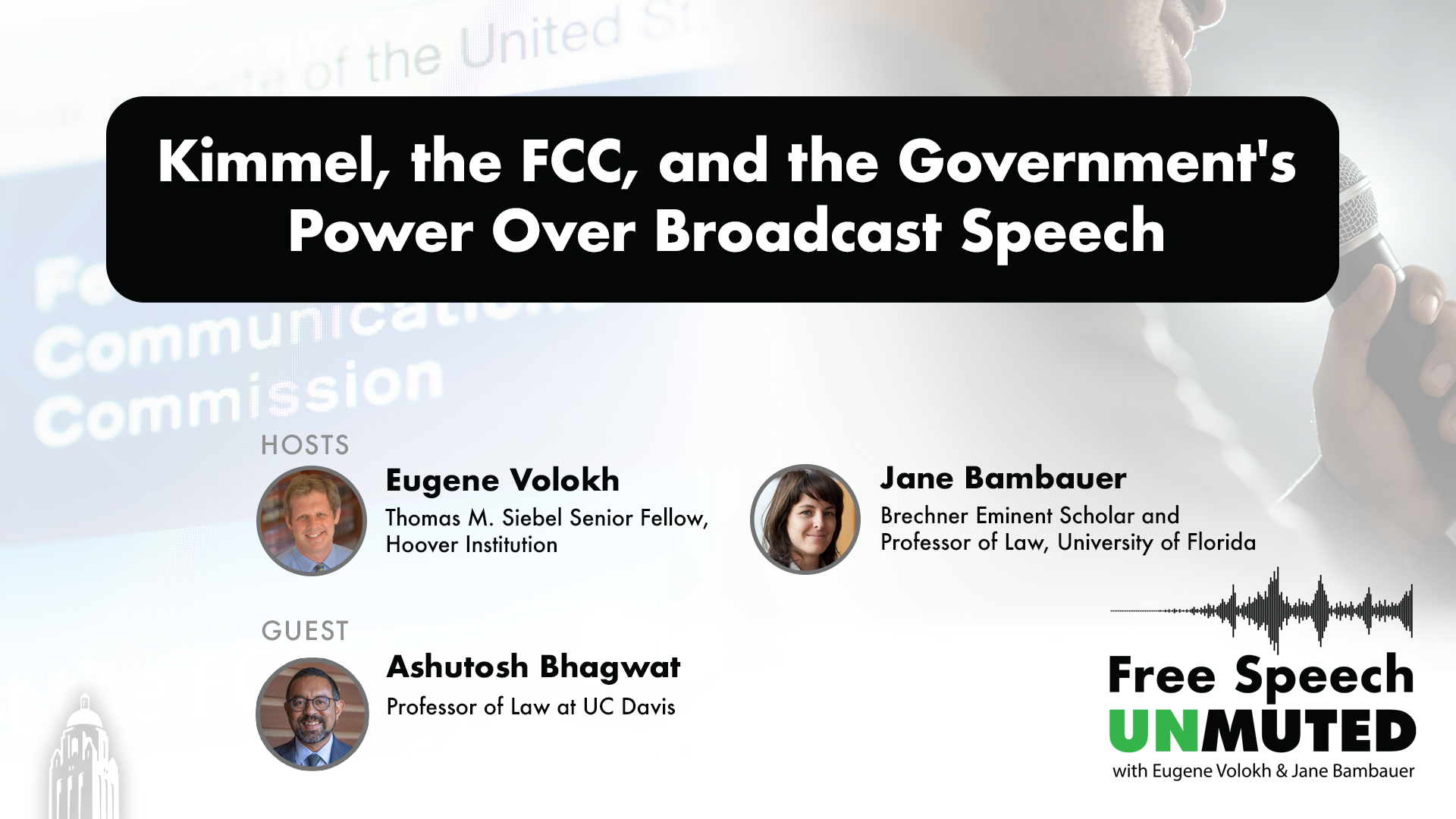- Law & Policy
- Politics, Institutions, and Public Opinion
- Revitalizing American Institutions
Eugene Volokh and Jane Bambauer are joined by Ashutosh Bhagwat (Professor of Law at UC Davis) as they discuss the FCC’s ability to regulate broadcast speech, directly and indirectly. Jimmy Kimmel, the old Fairness Doctrine, Ted Cruz, affiliate/network relations, and more.
Recorded on September 22, 2025.
>> Eugene Volokh: Free Speech Unmuted podcast from the Hoover Institution. I'm here with my co-host Jane Bambauer from the University of Florida. I'm Eugene Volokh, and I'm a senior fellow here at Hoover and also an emeritus law professor at UCLA. And we're delighted to have with us Ash Bhagwat, who is a professor at UC Davis Law School.
And he actually knows a lot about the FCC and Federal Communications Law. And it's always important, but especially, especially in light of the events of the past week. So for, for those who have been, I don't know, on vacation to Mars, perhaps the. The FCC chair made a statement last week which was understood, I think correctly understood as essentially threatening some possible retaliation against abc based on particular statement that Jimmy Kimmel made on his show that seemed to blame, blame conservatives for the shooting of Charlie Kirk, suggesting that the shooter was in fact a member of the MAGA movement, which apparently he was not.
So the chairman basically called on ABC to suspend Jimmy Kimmel and basically threatened it with possible FCC retaliation. So, Ash, tell us, what was he possibly threatening ABC with? Could he have made it stick? What should we think about that kind of threat? What's the legal significance or the legal implications of that kind of threat?
>> Ashutosh Bhagwat: So lots of things to say. One, very obviously, the FCC has no direct power over ABC or Disney. The FCC regulates its licensees, which are the local broadcast affiliates of ABC that transmit ABC programming. But that is not ABC, the parent company. So what he was pretty explicitly doing was threatening those local licenses.
And it turns out there are two companies, Sinclair Broadcasting and Nexstar, that own a whole bunch of ABC affiliates. And I'll come back to those companies in a sec. But that's where really the threat was going to. Despite the fact that he said abc, what was the threat?
Well, he talked about the public interest. And what is true is that the FCC, the statute governing all of this, the Federal Communications Act of 1934, does say that the FCC should regulate broadcasting consistent with the public interest, convenience, and necessity. And there is this general idea that licensees are supposed to act in the public interest when using their license because the license is seen as a privilege rather than some sort of a right.
And it's something that's renewable. You don't keep your license forever. I think it's now eight years. It used to be five years. You have to go back and get it renewed. Is it possible that actually he could have taken legal action that stuck against licensees under the public interest standard?
I think the answer is quite clearly no. The Communications act is clear, and a million other things are clear. That the kind of viewpoint based control of programming that the Chairman was trying to accomplish through the public interest standard today, I don't think there's any legal grounds whatsoever for that.
There was a time from the 1940s until 1987 when the FCC enforced something called the Fairness Doctrine, which was a set of rules that required more balanced coverage by broadcast licensees. And maybe one could get some hay out of that. But The Reagan administration FCC repealed that rule in 1987, despite the fact that the Supreme Court had earlier upheld it in the 60s in a case called Red Lion.
Given the demise of the Fairness Doctrine, which honestly no one regrets or almost no one regrets the loss of, I don't think there's any real legal threat that could stick. But here's where things get complicated is imagine if the FCC held up renewal of licenses for some of these local stations.
That's life or death. The reality is that in a heavily regulated environment, those kinds of slowdown actions can have significant economic consequences. And so people often cave in situations where if they would litigate, they would win simply because they don't want to bear the risk or the delay or all of those other things.
Finally, another complication is that the FCC has pretty broad regulatory authority over basically corporations that own law, broadcast licenses and mergers in this space are subject to FCC review in addition to regular antitrust review. And we all know that merger review can be extraordinarily risky because delays in merger approvals can be fatal to a corporate transaction if they go on for long enough.
Even if you want to litigate by the time you get all the litigation done, the economic circumstances that supported the merger might all be gone. And in fact, Nextar, one of these companies that is one of the largest owners of ABC Affiliates, has a merger proposal bending before the fcc.
And I guess what this tells me is something I have believed for a long time, which is that creating heavy government regulation in media spaces is honestly a terrible idea. The Fairness Doctrine was a terrible idea. It has been abused, was abused when it was around. And all of this other stuff provides levers of pressure.
And I'm not saying that they were used like I'm not, certainly I'm not aware of Chairman Carr saying anything about this merger. But corporate leadership, of course knows all of this is out there and all of these risks are there. And so to what extent. On the other hand, it is also true that Sinclair and nexjar generally are considered to be conservative oriented corporations.
So their actions in choosing not to carry Charlie Kimmel, Judy Kimmel rather, may have been voluntary. It's possible it's not inconsistent with their general ideological take. Or maybe they saw it as political pressure. Frankly, if Brendan Carr had not spoken up and his speaking up was incredibly foolish, in my opinion, then we would have known what these people genuinely wanted to do.
But because he was issuing these threats, we can't know whether or not their actions were a result of this threat or not. Because it is their decision, Nextar's and Sinclair's decision not to carry Kimmel that seems to have triggered ABC's decision to drop Kimmel.
>> Eugene Volokh: Very helpful. Thanks very much.
So, yes, so the government has more authority to regulate broadcasters and broadcast programming than it does over newspapers, let's say, which it has very, very little over the Internet, rightly or wrongly. I think we probably mostly agree wrongly the court has allowed such authority. But it has nonetheless, the authority is not nearly unlimited.
In fact, it is quite limited if it actually comes to court. It's just that the government can make it very painful for people even if they were eventually to win in court, and that's often a reason they don't want to litigate at all. So this actually brings up, of all things, the National Rifle Association.
There was a case called NRA Vivulo last year where the court considered whether it's constitutional for. Actually, actually, I'm sorry, let me start again. I want to get the procedural posture right. There was a case last year, NRA Vivulo, which actually bears on this question of government threatening, or in that case allegedly threatening intermediaries with retaliation if they don't block something for a speaker.
In that case, it was New York officials, New York regulatory officials, that were accused of pressuring insurance companies, financial intermediaries to cut off or to limit their relations with the National Rifle Association. Because the allegation went because of the New York officials disapproval of the NRA's viewpoint, NRA sued.
And the question before the court was if the facts were as NRA alleged, would that show a First Amendment violation? And the court said yes, it didn't resolve the facts, but it said if indeed the New York regulators pressured insurance companies this way, that would be an indirect attempt to interfere with the NRA's speech, but still an unconstitutional attempt.
So I think the logic of that would very much apply if indeed the ABC was pressured into the suspension. Now we know it's just a temporary suspension, but pressured into it by the threat of fcp. Of course, the fact that there could in theory be a First Amendment claim doesn't mean that one will be brought and that it will be successful.
Given all of the procedural complications that are raised, questions like standing and the like, among other things, I'm pretty sure that Jimmy Kimmel, for good business reasons, wouldn't want to sue the the government in a situation where it may reflect badly on his employer or even if he leaves on his ex employer.
That's just not good business in Hollywood to publicize like that through the legal process. But in any event, this could indeed, I think, given all that, be a First Amendment violation, whether or not it would come to court.
>> Jane Bambauer: So yeah, can I ask something about the standing issue?
Because the other case besides the NRA Vullo case that this incident is reminiscent of is the Murthy vs Missouri case. So that was the case that involved the Biden administration putting pressure on the social media platforms to remove misinformation or what, at least what the Biden administration considered to be misinformation.
And that case, the fifth Circuit had found that there was something close enough to coercion. We had an episode on this, but the 5th Circuit test didn't require strict coercion. But in any case they found enough to say that there was a First Amendment violation, the Supreme Court dumped it on standing.
And you know, since that case, the popular understanding, like when I hear people reference the whole, you know, sort of Biden era scandal, they treat that case as a win for the platforms and suggest that, you know, the government basically did nothing wrong here. I think these facts, Jimmy Kimmel, if he did decide to sue, which might not be smart, but if he did, he probably has the clean or at least much cleaner version of causation that was lacking in the Murthy case because we have ABC hastily suspending him and then a few days later, after there was counter pressure, reinstating him, which I think suggests that ABC really was chilled and then kind of embarrassed and had to sort of backtrack.
And so, Ash, I'm wondering, I don't know, do you see uncertainty with something like standing, or do you see parallels between this and the Murthy case?
>> Ashutosh Bhagwat: There are clearly parallels, and I think you're right. But I want to give one caution, which is it's why I earlier mentioned the fact that nexstar and Sinclair both historically have conservative leanings.
It's not inconceivable that just as in the Morty case, people concluded that the platforms were going to do what they were going to do regardless of the Biden administration's pressure. It's not inconceivable that the argument would be made that actually nexstar and Sinclair were reacting to their own preferences and that what Brendan Carr said was completely irrelevant.
Do I think that's the case? No, I don't. But proof is always difficult, rght? And if in fact, nexstar and Sinclair decided to cooperate with the FCC and testify that they would have done the same thing anyway as the platforms did in the morphe litigation. I don't know how you get past that.
>> Eugene Volokh: Yeah, I think that's right. Now, Kimmel has an advantage that the plaintiffs in Murthy didn't have, which is presumably he's got buddies at ABC who would be willing to kind of tell him back channel. Yes, we did this because of FCC pressure and there's evidence and we won't just.
>> Jane Bambauer: Indirect, but-
>> Eugene Volokh: Turn it all over voluntarily but if you subpoena us, we'll provide it or they'll tell him, look, Jimmy, it wasn't about the fcc. It was about a lot of outrage from our business partners. And frankly, maybe you're not getting the audience that we'd like you to get.
So he may have access to that information, but there also, I take it, there might be. I haven't fully looked into this, but there might be various immunities involved. It's hard to sue the government. It's hard to sue, in particular an agency head for a statement that he made, which wasn't actually an official government action, just because presumably he'd have to do it together with other commissioners.
So in any event, so there would be complications. But if we just step back and forget about standing and such, I do think it's important to recognize that, understanding First Amendment law, government officials threatening intermediaries with the retaliation if they don't cut off certain speech, and if the speech is constitutionally protected, that is itself a First Amendment violation, maybe nobody can sue over it.
But it's something that I think we should pay attention to. And I think it's noteworthy that Ted Cruz, very conservative Texas senator, spoke out with regard to this and pointed out that this was a very dangerous thing for.
>> Ashutosh Bhagwat: Tucker Carlson in fact.
>> Eugene Volokh: I'm sorry?
>> Ashutosh Bhagwat: Tucker Carlson.
>> Eugene Volokh: I did not know the FCC's move. Yeah.
>> Jane Bambauer: And so has Ben Shapiro to round out the-
>> Ashutosh Bhagwat: Good, because, I mean, as all of them point out, it's a loaded weapon, right? I mean, because the FCC will have a Democratic majority at some point, and then.
And they don't want to face that situation, especially because there's been muttering, incomprehensible in my view, but there's been muttering from this FCC under Brendan Carr that they want to revive the Fairness Doctrine, which I think in the Internet era is completely crazy. And I would hope the Supreme Court would strike it down 9, 0, because the scarcity conditions that justified the doctrine in the 60s obviously do not exist anymore.
But here's the thing that I find difficult to understand is that Brendan Carr knows all of this. This is not, in my opinion, a close First Amendment issue. Can the government threaten private parties in order to shut down speech? I mean, no. So what the goal here was is difficult for me to actually fully understand.
>> Jane Bambauer: Especially given that, you know, before Brendan Carr made those statements, Charlie Kirk was the, the victim, the martyr of circumstance. And then those statements completely turned the narrative around for at least the, you know, moderate middle right. So among the moderates, I'd say, or in, in any case, at least there's at least a competing news issue, right, thanks to Garfield.
>> Eugene Volokh: Right, so I'm not a political analyst of any accomplishment or predictive power, but my sense is what happened in 2024, among other things, is that the Democrats had badly overplayed their hands. They were running against a highly flawed, vulnerable candidate in Donald Trump. But in, in addition to their disinformation campaign of some people trying to pretend that President Biden was still up to things that badly backfired on them.
In addition to that, I think they had taken some very aggressive culture war stances with regard to a variety of things, including just generally cancel culture attempts at suppressing people's speech, as well as particular positions with regard to transgender issues that I think were way out ahead of or at least different from what the majority of voters believed in many ways.
And they were punished. It was a close election and I think it's not unlikely that those kinds of issues did swing the couple of percent of voters, probably 1%. If they had swung from one way to another, I'd calculated, then Kamala Harris would have been so. Likewise, it seems to me that the Republicans are in danger of overplaying their hands by portraying themselves as kind of out of touch with, I think many American sentiments that this is the government going too far.
But who knows? Who knows? Again, I can't even say with confidence what happened, why it happened in 2024, it's going to happen in 2028 or 2026, who knows? So since you're here, I wanted to talk a little bit more the Fairness Doctrine of Federal communications policy and such.
I am not at all a fan of the Fairness Doctrine and I'm not a fan of just generally lower protection for, for comm. For broadcasting. But I wanted to run like, perhaps try to try to give the best version of the argument for some degree of extra broadcast control just so we can lay it out for, for, for our audience.
Can we shift to that or. Jane, do you have more to say about the Kimmel matter?
>> Jane Bambauer: No, let's shift.
>> Eugene Volokh: So here is one way of reading the redline opinion. Red Line was the case that upheld both the Fairness Doctrine and the Personal attack Rule, which I think was in many ways different and more manageable than the Fairness Doctrine.
>> Jane Bambauer: Can you describe both? I think it might be useful, yeah.
>> Eugene Volokh: Right. So actually, Ash, why don't you tell us about the Fairness Doctrine and personal attack Rule? Because I think I've got them right, but I know you have them right.
>> Ashutosh Bhagwat: So they were always linked because they were both part of the same general philosophy that because a broadcast license is a privilege held on behalf of the public, what really matters is ensuring that licensees show the public the world as it really is, rather than their own biases.
So the Fairness doctrine was a general requirement that A, they devote time to public affairs in their programming, they cannot just do sports and quiz shows, and B, that in doing so they have a balanced set of coverage. They can't just take a hard political slant, right? The kinds of things that today on cable news happens all the time.
Cnn, Fox News, you couldn't do that. The personal attack rule was connected and basically said that if you broadcast information that was attacking, I think it's a political candidate or an office holder, they had to be given time on air to respond. And the Red lion case actually involved a personal attack issue.
But the reasoning of that case was that this is a reasonable thing to do because the number of licensees in any area is limited. Because remember, this is still the era when broadcasting means bunny ears and TVs and there are only a handful of VHF stations and a few UHF stations that just did reruns.
So you're really talking about very limited channel capacity. Not that limited, honestly. And in radio, it was never that limited. But the logic was, because of these limits, spectrum scarcity is the term that's often used. It was okay for the government to treat broadcast fundamentally differently from all other media, such as at the time, print newspapers and magazines, later on cable television, later on the Internet.
Broadcast has always been kind of the odd duck, the one that's subject to more government oversight.
>> Eugene Volokh: Got it. So thank you for laying it out. And so here is my one reading of the Red lion decision that strikes me as worth airing because I think it's the most sympathetic argument.
So one way of thinking about it is setting aside for now scarcity as. Such. As opposed to. Well, in any case, setting aside scarcity as such, There are two kinds of broadcast regulations, not one that were at issue in Red Lion. The one that nobody talked about is the one that applies to 99.999% of US and that's we're not allowed to broadcast.
If we try to broadcast, it's illegal. I think it's a crime.
>> Jane Bambauer: That's what pump up the volume was about.
>> Eugene Volokh: Exactly, exactly right. Well, blast from our childhoods or. So it was illegal because we didn't have a license. And it's not like a driver's license. We just need to pass some tests.
We couldn't get a license. And then 0.001% had such a much more privileged status than the rest of us did. They could broadcast, they could broadcast on this channel. And just because they had the special access part of the deal was in exchange they have to provide some extra, some minor ability to participate for.
For the rest of us. For the 99.999% had to provide some degree of balance. Not all the time, just occasionally might have to air other views or even kind of in a different, in the broadest version, some portion of the time, but nowhere near the majority that have to air balanced views.
Likewise with the personal attack rule, if they're attacking you and you're not allowed to by law, you can't respond, you can't put up your own broadcasting equipment to. They just have to give you access. So that's the theory. The deal was if you get the special privilege that the rest of us do not, whether or not there's that much scarcity or not, there may be more broadcast stations in your market than newspapers, but at least newspapers aren't operating the special privilege you are.
You're being given the special privilege and there's a condition to provide some degree of access to the rest of the public. So that I think is perhaps the most sympathetic argument in favor of some version of those doctrines. Ash, what's your response to that?
>> Ashutosh Bhagwat: First of all, yes, that is clearly the most sympathetic version of Red lion, with the idea being simply that because of those circumstances, and I think you can't get rid of scarcity, it's precisely because there's a significant limit to the number of broadcast frequencies that we can't all get access to broadcasting.
Right, in a way, that even started to change when cable came along, because then you had public access and things like that. But so, yeah, that is absolutely the most sympathetic argument in favor of both the personal. Attack rule in the favor Fairness Doctrine. The flip side argument which the FCC actually itself made in 1987 when it revealed the Fairness Doctrine was that this systematically disincentivizes hard hitting coverage of public affairs.
What it encourages is either avoiding public affairs or being so mushroomly centrist that no one's going to be offended. And that you're balancing those two policy considerations, right? I think that it was a mistake. I think that in fact the impact of the Fairness Doctrine was to create a mushy middle for most broadcasting.
It's not a coincidence that Rush Limbaugh went in the air about a year after the Fairness Doctrine was revealed. Before that he couldn't have, right? And not saying I'm a big fan of Rush Limbaugh, but that's the beginning of very politicized radio. So yeah, it's a policy choice.
I think in 1969 it was a difficult policy choice. I think in 2025 it's absolutely not because you can respond now. Most people, and especially most young people, are not getting their news from broadcast television.
>> Jane Bambauer: Yeah. So can I ask a question about that? Why is it that these broadcasting licenses are so valuable?
Can you tell us a little about the economics of, of, you know, it must be that more people still get their content from broadcast than I can imagine given that you could could access ABC shows over the Internet and whatnot. So do you have a sense of why, you know, why ABC would be afraid of Sinclair's power, for example?
>> Ashutosh Bhagwat: Well, ABC is afraid of Sinclair's power because the way they reach cable audiences is via the Sinclair stations.
>> Jane Bambauer: Cable options.
>> Ashutosh Bhagwat: Even if I'm going, if I'm getting my TV via Comcast or even as I do via YouTube TV, if I want to watch Jimmy Kimmel, like the actual show and you know, I'm an old man, so I might want to do that.
Unlike the kids, I would go to the ABC channel, that is the local broadcaster that's carried by both my streaming service or my cable service. So that's why ABC cares, why not.
>> Jane Bambauer: Enough people do over the top TV to, to use that. Not enough. Yeah, that like, I mean, because you could also just go to the ABC app and then Sinclair is not involved.
Is that right? Maybe. I'm not understanding.
>> Ashutosh Bhagwat: I am not sure.
>> Jane Bambauer: Okay.
>> Ashutosh Bhagwat: Probably right. But I'm not sure whether ABC actually live broadcasted shows on its app because.
>> Jane Bambauer: Okay.
>> Ashutosh Bhagwat: That would be competing licensees. So that would be.
>> Jane Bambauer: Yes, they probably don't allow it.
Okay, got it.
>> Ashutosh Bhagwat: The only TV I watch live is frankly NFL football. And I know there are a billion rules on co broadcasting. NFL football.
>> Jane Bambauer: Got it, okay.
>> Ashutosh Bhagwat: Almost nobody gets their TV via bunny ears anymore. And so I for years have wondered why people are still maintaining these licenses and these broadcast facilities when it's a trivial amount of the viewing population, right?
I don't know this for a fact, but what I can make out, and I'm a wireline telecom guy, not a broadcasting guy, I want to emphasize that in my background, but what I can make out is, is that if you're an existing broadcaster, you get access to other frequency, but that was theoretically one's going to be used for high definition broadcasting.
Dumbest idea ever in the Internet era. But there you are. And there are perks that go with that that actually have potentially very high cash value. That's the best I can tell because the numbers do not show a lot of people relying on bunny ears, right? And the people who rely on bunny ears are, I'm sorry, but they're overwhelmingly going to be people that were the least valuable in terms of spending capacity because they're doing it because they can't afford cable.
And so advertising to them is not all that valuable.
>> Eugene Volokh: You do realize that I don't know what fraction of our audience, but certainly well into the double digits, if not majority, have never seen the bunny ears. You want to tell them about bunny ears?
>> Ashutosh Bhagwat: Sure. Because I have to explain this to my students every year, right?
Because again, when I start teaching telecom cases, they look at me like I'm a Martian. So back in the day-
>> Eugene Volokh: Martians I've told.
>> Jane Bambauer: They have jokes.
>> Ashutosh Bhagwat: Two years. So back in the day before cable television, which was, you know, basically for most households through the 80s, cable television really was picked up in the late 80s, early 90s as well.
Major technology. The only way you could get television is the same way you get radio in your car, which is via the electromagnetic spectrum. And then your tv, which was a huge thing that had terrible, terrible, just visuals, but it had these two pieces of metal that stick out in a V on top of it.
And those caught the electromagnetic transmission, which then converts in using technology into a picture. Just as today if you're listening to a radio, the radio in your car, like real radio, not Internet radio, but like the local radio station, there's a antenna built into your car somewhere. It's.
>> Eugene Volokh: We call that a unicorn horn, though, because it's only one. So we call it a unicorn horn instead of.
>> Ashutosh Bhagwat: Right. And they're, they're very inobtrusive. Now back in the day, the antenna on the car was also you could see.
>> Jane Bambauer: People decorate with.
>> Eugene Volokh: When you go through a-
>> Jane Bambauer: A car wash.
>> Eugene Volokh: You had to shove it down.
>> Jane Bambauer: And some people decorated them with the little balls. Remember by the way, there is breaking news. Thank you, Scott. That breaking news for us at the time of recording that Sinclair has indeed announced that it will be preempting ABC's broadcast of Jimmy Kimmel and will be replacing it with news programming so.
>> Eugene Volokh: And this is, it owns 31 ABC affiliates. So you know, it's a considerable number, although my guess is it's a relatively small fraction of the total ABC affiliate.
>> Ashutosh Bhagwat: Small fraction of the total. Yeah. And I think Nextar may own more, but again, nothing near between them.
It's still nothing near a majority of the total. But that is interesting because that cuts in towards the idea that maybe this really is their own voluntary choices.
>> Eugene Volokh: Right, so let's, let's return to this, to what we were observing with, with regard to, with regard to what Chairman Carr was at least trying to do.
Whether he succeeded or not, whether he was the but for cause of the suspension or not, it sounds like he was trying to pressure ABC directly or otherwise into suspending, suspending Kimmel. And the, the question, and I think you're quite right that this is potentially very dangerous, but the question is what is to be done about that?
Given that the FCC does seem to have this power, even if it's not bring back the Fairness Doctrine and even if it isn't going to just cancel licenses, it does have power over these, these business deals of the, of the affiliates. It has all sorts of pressure it can exert.
What, what can be done? What can be done?
>> Ashutosh Bhagwat: I, I mean this is coming from me, this is going to sound crazy, but I have always favored a suggestion of how to do all of this that was promoted by Ronald Ghost, the Nobel prize winning economist from the University of Chicago, which was, he said just get rid of all of this licensing stuff and just sell property rights, tradable, sellable property rights to the airwaves as we do in other contexts and other forms of use of the electromagnetic spectrum and get out of the censorship business altogether.
I still think that's the better solution. Like, you know, I'm full libertarian on you because I think that especially in an age and with broadcast television isn't that important. The arguments in favor of close oversight have really gone away. And we're seeing why close oversight of conglomerates is problematic, especially because these companies are so big, right?
It's not abc. We keep saying it's abc. It's Disney.
>> Eugene Volokh: Right.
>> Ashutosh Bhagwat: And Disney owns so many different things that are subject to political pressure, many of them having nothing to do with broadcasting.
>> Eugene Volokh: Right.
>> Ashutosh Bhagwat: The number of places in which you have press points is just very high, right?
>> Eugene Volokh: Although that suggests that maybe cutting out FCC control is going to diminish them a little. But there'll be still mergers that Side of FCC jurisdiction. You know, in principle, even, you know, if it's just a broadcaster, the mayor can call up the broadcaster and say, you know, we're sending in some inspectors to inspect things.
I'll bet you we're going to find wiring problems. Right.
>> Ashutosh Bhagwat: This problem has always existed. Right. I mean, yeah, and, and, and there's nothing we can do about it. I think the FCC is particularly concerning just because it is full on focused on media and content all the time.
The FTC's interests are much more broadly spread, you know, but. Yeah, I mean, the risk of intimidation of media is hardly a new thing, right? It's been going on for a long time.
>> Eugene Volokh: Yeah.
>> Ashutosh Bhagwat: Going back to the framing in many ways, you know, think about the Sedition Act.
Right. I mean, it's not-
>> Eugene Volokh: Right, although that was sort of a traditional intimidation. It was the threat of criminal punishment. There was a standard process for fighting it. The indirect ones are in some respects, in some respects harder to deal with than the direct ones.
>> Ashutosh Bhagwat: Again.
>> Jane Bambauer: Yeah. There's an argument that, you know, when the FTC makes, makes some, you know, raises an eyebrow about antitrust or issues or something that, that can be, you know, have a bigger impact without, without as much public accountability. Certainly not as much outrage, right?
>> Ashutosh Bhagwat: From people who- Example of that.
So the FTC recently approved a merger between two very large advertising agencies. And one of the conditions was that advertising agencies not deny platforms advertising based on the content they carry. This is all on behalf of Twitter X and the whole the litigation going on Twitter basically sued a group of advertisers claiming that they were being boycotted.
And one of my colleagues and I filed comments in the FTC proceedings saying this is really problematic. Like they are using antitrust law as a lever to get at content. So this is happening, right? This is not. But the FCC has just has just jurisdiction focused on the broadcasting industry.
So I don't, I'm not suggesting if we got rid of the FTCC tomorrow and took on the, you know, took on the Ronald Coase approach, would that solve all the problems? Absolutely not, absolutely not. And as media ownership has become part of large corporate conglomerates, that is potentially more risky.
And another example is Jeff Bezos now owns the Washington Post. Bezos has a lot of business interests that have nothing to do with the media.
>> Eugene Volokh: Right.
>> Ashutosh Bhagwat: And which are subject to pressure. And that that's concern, no question.
>> Eugene Volokh: Right. Well, that's a very pessimistic attitude. Not even attitude, pessimistic reality.
Pessimistic view of reality, but an accurate, I think, realistic view of reality. There are a lot of pressure points. And I suppose one thing that could be done is just to have pushback, maybe not even in court pushback, but political pushback. Maybe, maybe the fact that ABC has, has reinstated Kimmel might make the perceived political benefits of doing something like that less for both, for Chairman Carr, Chairman Carr and future FCC chairman, and maybe the fact that Ted Cruz and other conservatives have spoken out will provide some sort of political pushback.
But yeah, this is in many ways it's not quite an intractable problem, certainly a problem that's difficult to track.
>> Ashutosh Bhagwat: I think it's clearly correct. I mean, it's hard to imagine understanding what ABC just did by reinstating Kimmel, except as a reaction to really, I think I doubt if they recognize just how sharp and bipartisan the public reaction was going to be.
Here's another thing, and this is not in my bailiwick cuz I'm thankfully in no way a proceduralist in courts, but it would be good if we had ways of fast tracking First Amendment litigation so that it could not delay, it could not become a tool of just getting your own way, right?
Because a lot of this, as I said earlier, it's not that these people, if people who choose to sue, would lose on the merit, they would surely win. Many of these institutions aren't close on First Amendment grounds. It's that they don't want to bear the delay and expense of litigation.
And maybe there's something bipartisan because honestly, even though right now it's a Republican administration, if I was Ben Shapiro or Tucker Carlson, I would be worried about this turning on me in the future, which, and I would emphasize equally wrong. So maybe there is in the face of this, some stomach.
And I say this with all the pessimism due for some sort of bipartisan sort of movement in Congress to create some procedural ways of speeding up First Amendment-
>> Jane Bambauer: Attorney's fees, don't you think attorneys fees would do it?
>> Ashutosh Bhagwat: Attorney's fees are a good start, but.
>> Eugene Volokh: So if you're talking about procedural tools for expediting claims related to free speech, they actually do exist in many states.
Anti-SLAPP laws even setting aside the attorney fees part of the point is when you're sued for your speech, you can get it pretty quickly dismissed, the theory goes. Likewise when it comes to prior restraint is a vague term in First Amendment law. But let's when it comes to injunctions against speech, courts often appreciate the importance not always, but often appreciate the importance of dealing with them promptly and sometimes will.
In fact, appellate courts will vacate the trial court decisions in a matter of days, which is blazing fast by the standards of our legal system, surely. But yeah, if you want to have expedited processing as a plaintiff, as a challenger who goes through a-
>> Jane Bambauer: Declaratory judgment sort of case.
>> Eugene Volokh: Right, that is harder, harder to arrange. And yes, it would certainly hope if there was bipartisan legislation somehow I think it today this doesn't seem to be in the cards. But who knows? Who knows, maybe.
>> Ashutosh Bhagwat: No, it's not in the cards. Maybe maybe you know, this is because this problem is not a problem of today.
The Jimmy Kimmel episode brought it to the core. But it's an ongoing issue that goes across administrations and you know, for example, the Biden administration won in the Murphy case on standing grounds. And I think that's the correct result. But I sure did not approve of what they did.
No, but to be clear, I think legally it's the correct result. But I don't approve.
>> Eugene Volokh: I don't even think that The problem is not that this is a problem of today. You're right, this is not just a problem of today. The problem is that the legislators are all legislators of today.
They're trying to figure things out as they stand today. And long term planning I think is a hard thing for any legislator who gets up for reelection every two or in case of Senate every six years. But I think these days there's even less attention. Being paid to the long term regrettably.
But what can we do?
>> Ashutosh Bhagwat: I agree with you. I think that. And this particular administration would have no interest in. We're talking about indirect pressure, right?
>> Eugene Volokh: Right.
>> Ashutosh Bhagwat: We're not talking about prosecutions of speech because that is easy to litigate, but indirect pressure. This administration is obviously has no interest in giving up the levers that it has.
>> Eugene Volokh: Right.
>> Ashutosh Bhagwat: The only question is if there's a significant change in Congress after the midterms, maybe there are enough Republicans who see the writing on the wall that they're willing to sort of join in the legislative effort. But I'm getting far out of my depths by trying on this issue.
>> Eugene Volokh: Indeed. Indeed. That is to say, indeed, I think all of us are experts on law, but we're not really experts on how law is actually made and how, how it is that legislation, what it is legislators are going to be willing to do and, and what not to do.
Because one of the things, it's a very sad subject to study.
>> Ashutosh Bhagwat: Yeah. And it's more than, it's more than just that, though. What has been revealing to me over the past really two years, because I include the late Biden administration in this, is how difficult it is to enforce your rights, even when you're clearly right.
>> Eugene Volokh: Of course.
>> Ashutosh Bhagwat: I mean, even the Vulo case and the National Rifle association case, they lost in the lower courts, which is astonishing to me given the facts that they alleged. I have no idea what the truth is, but given the facts that they allege, the fact that they lost in the court of appeals blows my mind, right?
But they did, and it illustrates the difficulty of getting. And then they win 9, 0 on the Supreme Court, which tells you how difficult it is to exercise First Amendment right.
>> Eugene Volokh: Absolutely true. That is absolutely true. And I should say even in the. You mentioned. Well, at least if you're being criminally prosecuted or sued, you could interpose the First Amendment as a defense.
Yeah. There are fewer procedural, formal procedural barriers, but still most people will plea bargain. Most people will settle because there are real risks. There are real costs if you're paying for your own lawyer legal fees, all sorts of. All sorts of problems. So, yes, the legal system as a tool for enforcing constitutional rights is, Is quite limited in its force.
>> Jane Bambauer: I think the only people who would welcome a prosecution for something that they've said are First Amendment law professors whose, Whose reputation could only improve with that kind of experience.
>> Eugene Volokh: There you go. There you go. So, as always, a great pleasure. Although I think this one is a particularly great pleasure.
Ash, thank you so much for joining us.
>> Speaker 4: Jane, great talking with you as well. And Scott Immergut, our indispensable producer, tells us we have more of these already stacked up in the pipeline. So watch your channels of communication. Whichever whichever way you get this, this podcast, we'll be having lots more interesting stuff coming in the coming weeks.
>> Ashutosh Bhagwat: Thank you for having me.
>> Speaker 4: This podcast is a production of the Hoover Institution, where we generate and promote ideas, advancing freedom. For more information about our work, to hear more of our podcasts or view our video content, please visit hoover.org.







